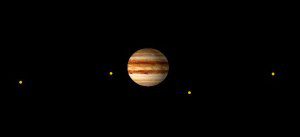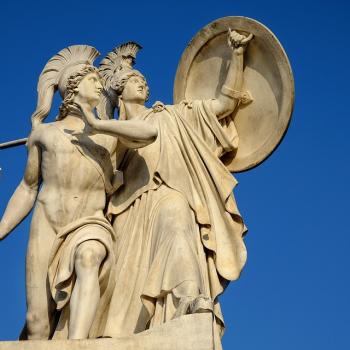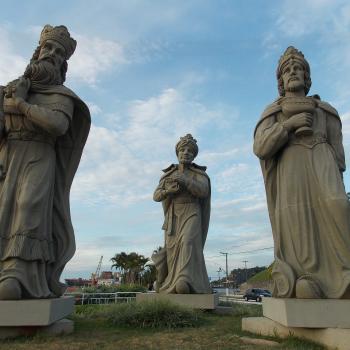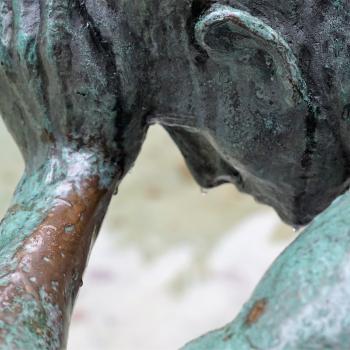 In our last Pascalian conversation, I left you with fire. And if you’ve had an experience like Pascal’s, perhaps you feel that all this blather about science and reason and blah, blah, blah is highly irritating. Fire is warm and bright and compelling. Science and reason is cold and comfortless. Can we really come to faith without fire? Are we left with only reason or experience as avenues of faith?
In our last Pascalian conversation, I left you with fire. And if you’ve had an experience like Pascal’s, perhaps you feel that all this blather about science and reason and blah, blah, blah is highly irritating. Fire is warm and bright and compelling. Science and reason is cold and comfortless. Can we really come to faith without fire? Are we left with only reason or experience as avenues of faith?
When I was in youth group, the kids with the “testimonies” were the fire-filled ones, zealous and passionate, overturned by their encounter with Christ. I had nothing to tell. No story. No bolt from above. No pits of degradation transformed into gardens of Eden. Just on and on, a long slow march, often in the dark—pursuing echoes and watching the flickers of firelight on the faces ahead of me. Even today, I warm myself at Pascal’s fire.
So, then, how do we come to faith? Where and how do we discover the truth of Jesus Christ? In the laboratory with the scientist? In the library with the philosopher? If it isn’t received through our senses or experiences, and it isn’t discerned through our reason, what is the channel of spiritual truth?
In 1660, a group of Englishmen established the first modern scientific academy in human history: the Royal Society of London. Part of their agenda, no doubt, was to create an alternative community of the like-minded who believed in the neutrality and reliability of science. The blasted and bloody Civil War (1642-1651) between the Puritans and the Royalists over that evil fusion of religion and politics had thoroughly convinced many of them that matters of ritual and cultus, doctrine and dogma were no basis for civic common ground. Science, however… now that had promise. After all, it was objective; it had visible results; it was changing the world; and—long sigh of relief—it had nothing to do with the embedded authorities (of religion, tradition, philosophy) that demanded conformity. This last benefit is embodied in its motto: Nullius in verba (“take nobody’s word for it”). Like Pascal, they embraced the principles of good discovery, especially experimentation governed by reason.
Scientific process, however, can generate a great deal of knowledge, but it cannot reveal everything. Scientists begin by constructing a hypothesis, and then craft a series of experiments that yield observable results. From those results, they draw conclusions that either confirm or refute that hypothesis. But no experiments can cover every possible angle of the hypothesis, and thus every conclusion contains an implicit caveat—that unknown substances or situations may nullify that conclusion. Indefinite factors must be bracketed and set aside, and yet they remain as silent witnesses to the infinite possibilities and potentialities untapped by human knowledge.
One of my students described this shadow reality quite well. As a child, he realized that, “I know everything. I cannot think of anything that I don’t know.” What a wonderful observation. How can I tell you all the things I don’t know?
Pascal, scientist that he was, did not put all his eggs in the science basket. There were, he argued, truths that science could not discover. His essential skepticism about the ability of science to generate all truth is no comment on the power of the scientific process, but rather on the nature of the knowledge that is sought.
We don’t conduct experiments, for example, to determine that the sum of the internal angles of a triangle is 180o. This is where reason comes into play. Sensory knowledge isn’t useful in that arena. It was, however, highly useful when in 1610 Galileo turned his telescope to the heavens and observed moons orbiting Jupiter. Without observation, no one could have deduced planetary moons by simply reasoning it through.
Nevertheless, sensory observation and experimentation are subject to their own fallibility. Sometimes senses deceive; perspective, the lack of proper instrumentation, and even illness can skew our observations. Senses told us that the sun was going around the earth; senses were wrong. All observation and experimentation must include a spirit of humility, the recognition that the conclusions we draw from this work are subject to revision should further observations be made that contradict our conclusions.
As Pascal reflected more deeply on this issue of types of knowledge, he developed careful ideas about what he called “orders of knowledge”—arenas or spheres of truth-discovery, each of which has its own laws.
He concluded that there are three orders of knowledge, each appropriate for its field of discovery. First, reason—the obvious, the factual, the indisputable. This avenue of knowledge is most powerfully demonstrated in realms of logic, like geometry. Second, empiricism—the fruit of observation and sensory accumulation. This avenue of knowledge is most clearly useful in the area of experimentation.
But a third order is necessary, an order of knowledge that probes the invisible, the real but unobservable, the place of dimension and depth within the human soul. How do we get to that?
This, Pascal, argued, is the function of le coeur. A literal translation of le coeur is simply the heart, but as soon as I write that word, you have a little red Valentine in your imagination, and you begin to assemble these words: emotion, sentiment, feeling, passion. This, however, is not what Pascal meant by le coeur. Knowledge of le coeur has nearly nothing to do with emotions.
If you assign organs of the body to the production of knowledge, you could say that the mind is the organ of reason; the eyes are the organs of empiricism; and the heart is the organ of all that is unseen and unprovable, but nevertheless true. This includes those things that we know intuitively but cannot describe or calculate—for instance, our space-time realities, with which we live but which we cannot explain—as well as those things that we know by faith.
Pascal wrote: “It is the heart which perceives God and not the reason. That is what faith is: God perceived by the heart, not by the reason.” (f. 424)
We have been given multiple dimensions of discovery, and as powerful and useful as reason and observation are, they remain within the dimension of the natural. To move beyond the natural into the supernatural requires a different kind of vision. Many of our faith-troubles lie in the application of an order of knowledge in the wrong arena. We want to prove God with our senses, or understand him according to our reason.
“Faith operates on the unseen (beyond the senses) and the a-rational (beyond the logical, not irrational or against the logical) in order to develop an awareness of the internal and the supernatural.”
“The heart has its reasons of which reason knows nothing: we know this in countless ways.” (f. 423)
Perhaps you feel I’ve brought you here to something rather elusive, and thank you very much, but give me fire. The encounter that Pascal describes in his Memorial is sensory, experiential, full of passion, but it alone is not enough to grant the knowledge of God. Lots of people have powerful experiences that are complete illusions, granting emotional highs and spiritual hubris, but granting no real revelation of Truth.
This should come as good news, as a relief. Instead of waiting and hoping for fire from heaven, and feeling unworthy or neglected that such an experience has not been entrusted to us, we can rest assured that God has granted each of us a way to discover him, if we want to.
Those last four words—if we want to—are crucial. This is where Pascal’s Wager comes into the story.
___________________
Note to Reader: This series on Becoming Neo-Pascalian considers some of the ways Blaise Pascal (1623-1662) speaks into the 21st century. It draws from my own research, published in Beyond the Contingent (2011), and citations are from the book, unless otherwise noted. The beginning of the series is here: Introduction.












